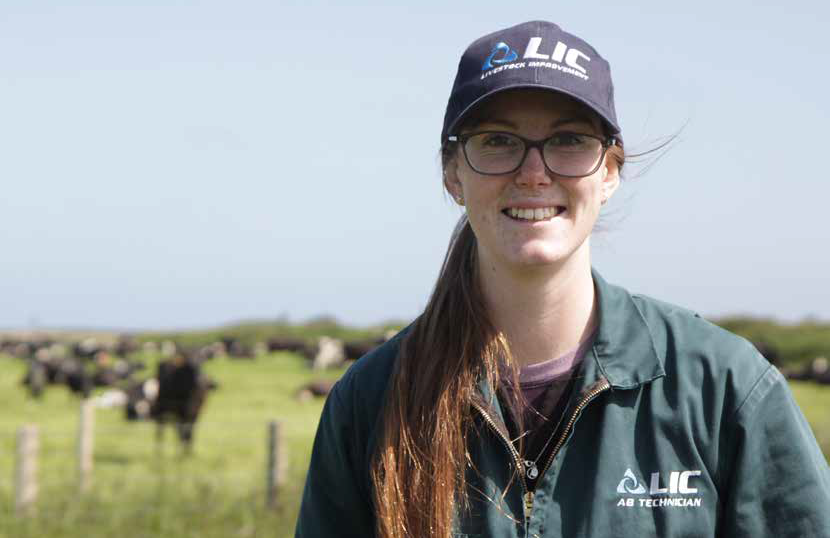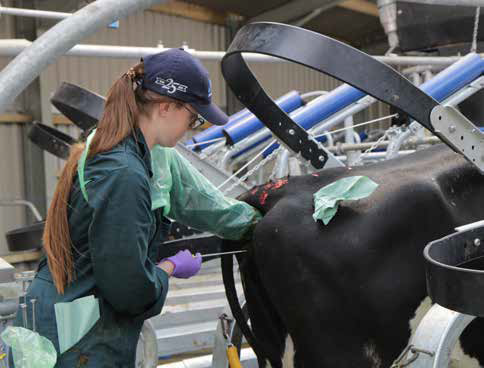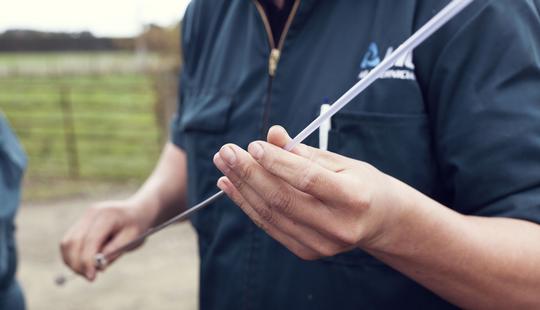Each year it is customary for a group of New Zealand LIC trained artificial insemination (AI) technicians to travel to the UK for the breeding season, made possible by the fact it is autumn in New Zealand when the UK is heading into the spring.

This year LIC UK welcomed 11 Kiwi technicians back on to UK shores. Not quite up to the pre-covid numbers of 18, but still, their appearance has been appreciated by farmers from Scotland to Wales and Cornwall to Cheshire.
23-year-old McKenzie Watson is one of this year’s cohort and has spent her time inseminating cows on the Lleyn Peninsula – the west coast of North Wales.
McKenzie arrived on the 26th of April and worked through the whole mating period.
This is McKenzie’s fourth season working as a highly skilled technician for LIC and she says she thrives in the pressurised environment the role creates.
Originally from Canterbury on New Zealand’s South Island, for the last two years McKenzie has been living on the North Island where her partner Josh has taken on a contract milking agreement.
With dreams of becoming a flight attendant after studying travel and tourism at school, inseminating cows is a far cry from flying around the world, but McKenzie says she couldn’t imagine not working with animals now.
Having started work with LIC in 2019, McKenzie was encouraged to enter the role by the AI Technician who inseminated on the farm McKenzie was working on.
“I was helping to load AI guns for the technician on our farm, her assistant pulled out, so I had to step up, and that is how I started. From there I applied for training and started my apprenticeship with LIC,” she says.
Training to become an LIC AI technician is tough, with extreme focus placed on hitting target non-return rates (NRR).
For the first six weeks of the apprenticeship, no new technician is allowed to serve more than 30% of the cows in any one herd, this protects the interests of the farmers and helps to spread the risk.
“The training is very strict, when I did my two-week course there were five groups of nine trainees and only four of us passed.” “We started for the first couple of days learning using an artificial cow, then we were given a certain number of cows to inseminate and the examiner gave us a percentage success rate.
The training is mostly hands-on, but there is a little theory work too.” McKenzie says the insemination runs can be very full on in New Zealand during peak mating season, and she has 7,000 cows on her books which means she could be serving hundreds of cows each day. LIC works on 1.3 services per cow, so a round of 7,000 would require about 9,000 inseminations. McKenzie says: “You could have 60-80 cows to inseminate on a single farm, and some carry out synchronisations of up to 250 cows, in that case you have to get someone to help you.
“It was a really challenging role at first, but I actually really enjoy it, I am quite results-driven and thrive under pressure. It is especially cool when I get to see the calves I produced coming though as heifers to be served.”
 In New Zealand’s off-season McKenzie helps with calf rearing on the farm where Josh contract milks, she also works in a racehorse stud as a stud groom which involves carrying out general daily duties, mucking out and looking after the horses, moving off for breeding, helping with scanning and handling the weanlings.
In New Zealand’s off-season McKenzie helps with calf rearing on the farm where Josh contract milks, she also works in a racehorse stud as a stud groom which involves carrying out general daily duties, mucking out and looking after the horses, moving off for breeding, helping with scanning and handling the weanlings.
Travelling to the UK was McKenzie’s first time leaving New Zealand apart from a visit to Rarotonga, one of the Cook Islands.
“Being given the opportunity to come to the UK to do something I thoroughly enjoy was something I couldn’t say no to. You always see things on social media about other countries and the different methods of farming – it has been really cool to come over and see it for myself.”
“One of the major differences between the UK and New Zealand is the attitude towards heifers. In New Zealand farmers don’t often put a lot into their heifers as they are not considered their best cows, whereas here everyone puts a lot of money into heifers.”
“The farmers have been really open and welcoming which has been really nice considering I don’t speak Welsh, I thought that was going to be something I would struggle with.”
“I would definitely recommend the experience to others, I think if I came back again it would be nice to see a different area, it has been a really cool experience and I have enjoyed it, but I think it would be nice to see a different part of the UK or Ireland next time, somewhere where people do things differently again.”
